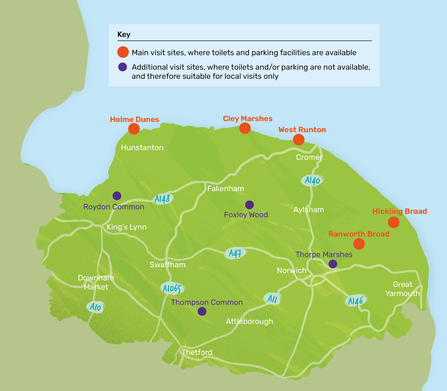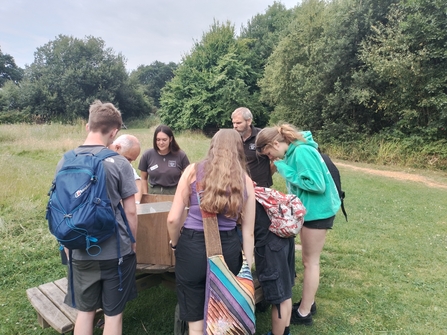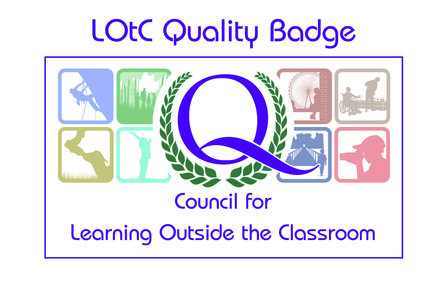
School environmental learning session (credit: Paul Harris/2020VISION)
Secondary and higher education
Skip to:
We manage some of the most inspiring wild spaces in the county and our vision is to reconnect people of all ages with wildlife. Our experienced Wilder Learning Officers deliver a range of curriculum-linked sessions, which inspire students to discover, explore and care for our precious natural world, through hands-on, engaging sessions.
Our secondary and higher sessions are suitable for KS3, KS4 and Higher students.
We are "Learning Outside the Classroom" Quality Badge holders.
You can either choose to visit us or we can visit you. So, get ready for a wilder learning experience!
You visit us
Our teams can't wait to welcome you to our sites and share the wonderful wildlife of Norfolk. We have lots of different sessions available at each of our visit locations.
Please note: only certain locations have facilities – you may need to consider this when booking your visit.

Discover and Learn map 2024
Activities at our sites
Your site visit will begin with a short introduction, followed by the different activities you have selected. Some sessions will require a full two hours (e.g. sand dune surveying), while others can be carried out in one hour.
Brilliant birds
This is a wonderful opportunity to observe and learn about the spectacular variety of birds found in Norfolk from our bird hides. Students will learn bird identification skills and compare the adaptations and behaviours of different species, culminating in carrying out a bird survey.
Available at: NWT Cley Marshes, NWT Hickling Broad, NWT Holme Dunes, NWT Ranworth Broad
Key words: Adaptation, behaviour, species, migration, prey, predator, conservation, food chain
Broads boat trip
Experience wetland habitats from a unique perspective. Our knowledgeable boat operators will provide a brief history of the Norfolk Broads, and what makes them so special to our wildlife today.
Available at: NWT Hickling Broad, NWT Ranworth Broad
Key words: Habitat, species, ecosystem, peat, conservation, management, food chain, nature corridors, biodiversity
Conservation management walk
An interactive exploration of the diverse habitats and species we manage sites for. This session provides students with insights into the opportunities and challenges faced by our special wildlife, and how we manage our sites for wildlife, whilst also keeping people in mind.
Available at: NWT Cley Marshes, NWT Foxley Wood, NWT Hickling Broad, NWT Holme Dunes, NWT Ranworth Broad, NWT Roydon Common, NWT Thorpe Marshes
Key words: Habitat, adaptation, behaviour, species, life cycle, camouflage, prey, predator, conservation, biodiversity, climate change, mitigation
Fossils and geology
Explore the fascinating ancient history of the beach and geology at West Runton. Students will learn how the climate and creatures have changed over time. They will have the opportunity to handle our fossil collection, and learn what to look out for when searching for fossils.
Available at: West Runton Beach
Key words: Geology, erosion, evolution, adaptation, extinction
Freshwater invertebrate surveying
A chance for students to investigate the biodiversity of the freshwater habitat; students will carry out freshwater sampling and invertebrate identification. They will use the Simpsons Diversity Index with the data collected.
Available at: NWT Cley Marshes, NWT Hickling Broad, NWT Ranworth Broad, NWT Thorpe Marshes
Key words: Management, sustainability, eutrophication, conservation, biodiversity, abiotic, biotic factors, turbidity, niche, abundance, species richness
Introduction to mammal surveying
Students will learn about the theory behind different mammal surveying techniques and explore their strengths and weaknesses. Students will carry out owl pellet dissection to get some hands-on experience.
Available at: NWT Hickling Broad
Key words: Predator, prey, life cycle, classification keys, biodiversity, ecosystem, conservation management, land-use
Rocky shore wildlife
This session explores the rare rockpool habitat and dependent rocky shore species at West Runton. Students will learn how species have adapted to live in the sea and on land in one of the harshest and most changeable habitats. This session can be adapted for surveying work. Please let us know what your area of interest is.
Available at: West Runton Beach
Key words: Habitat, North Sea, Marine Conservation Zone, adaptation, camouflage, predator, prey, sustainability, biodiversity, life cycle
Sand dune surveying
In this session students will learn about and appreciate the importance of sand dune formation as a natural sea defence. They will identify key stages in the psammosere, (sand dune succession), measuring the profile, plant diversity and abiotic factors along a transect. Students will have a key insight into the dynamic nature of the changing coastline.
Available at: NWT Holme Dunes
Key words: Succession, psammosere, pioneer species, dune stages, community, biodiversity, sea defence, erosion, deposition, longshore drift, native/non-native/invasive species, conservation management, systematic surveying
Self-guided
Visiting staff lead this session. This session can be incorporated as part of a visit with other, NWT-led sessions.
Available at: NWT Cley Marshes, NWT Hickling Broad, NWT Holme Dunes, NWT Ranworth Broad, NWT Thorpe Marshes, West Runton Beach
Terrestrial invertebrate surveying
This session is designed to enable students to investigate the species richness and abundance of terrestrial invertebrates in their chosen habitat/s. They will conduct an invertebrate survey using different techniques and consider the impact of abiotic factors on their results.
Available at: NWT Hickling Broad, NWT Holme Dunes, NWT Thorpe Marshes
Key words: Management, sustainability, conservation, biodiversity, abiotic, biotic factors, niche, abundance, species richness and evenness, sampling – random, systematic
Tourism
This session explores how tourism has changed the landscape and economy of Norfolk, looking at effective tourist management strategies and sustainable tourism options.
Available at: NWT Cley Marshes, NWT Ranworth Broad
Key words: Conservation management, stakeholder groups, costs and benefits, eutrophication, climate change

Teenage students on a reserve (credit: NWT)
We visit you
If you are interested in us giving a careers talk or attending a careers event you are holding, please get in touch via the booking form below.
Costs
Please be aware that the minimum number of young people for all NWT guided and outreach visits is 10. Accompanying school staff go free of charge.
| Secondary and higher (KS3, KS4, Higher) | Cost |
|---|---|
|
You visit us* *Costs only applicable to main visit sites. Booking is essential for all types of visit. |
Half day = £8 + VAT per young person Full day = £12 + VAT per young person Minimum charge for guided visit = £120 + VAT
Self-guided reserve visit = £1 + VAT per young person Boat trip + self-guided reserve visit = £6 + VAT per young person |
| We visit you |
Careers talk/event = Free |
Book now
Thank you for your interest in school visits with us!
We are fully booked for the remainder of the academic year, however, if you are interested in a visit from September 2025 onwards, please complete a booking form, and we’ll get back to you as soon as possible.
If you have any queries about booking a visit, please email us at educationenquiries@norfolkwildlifetrust.org.uk

